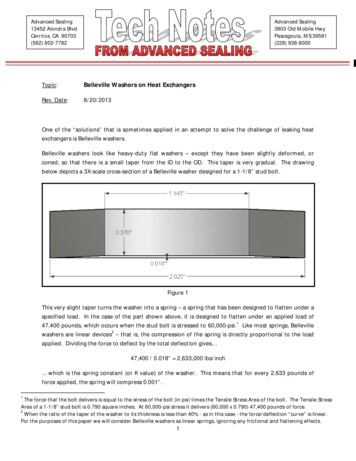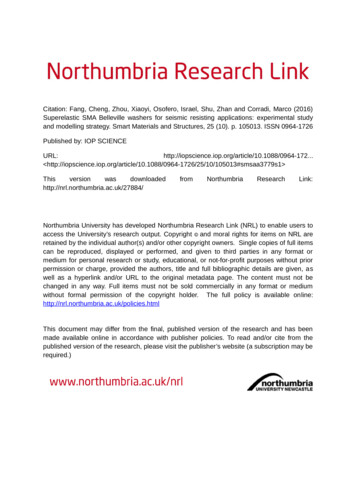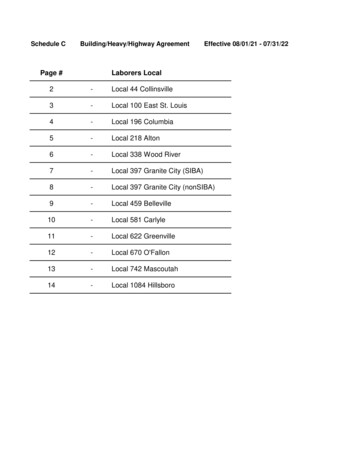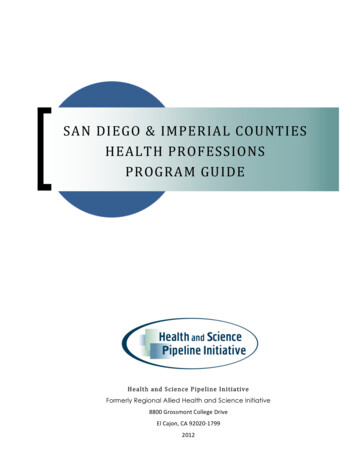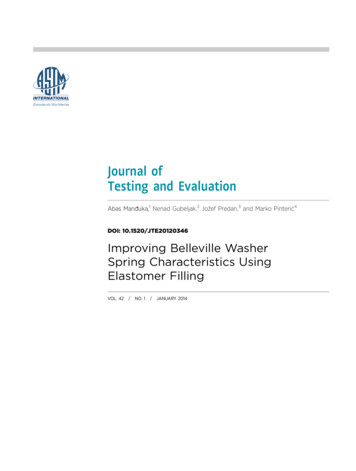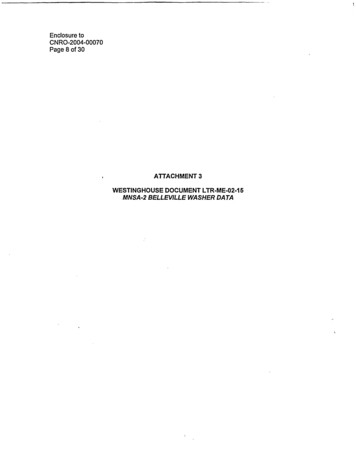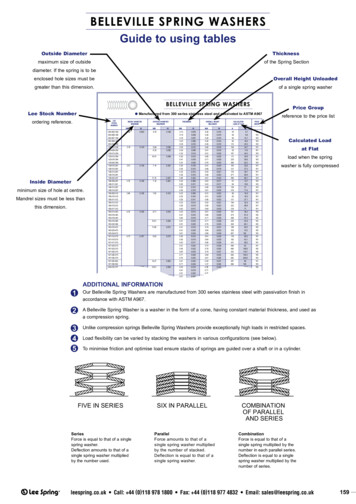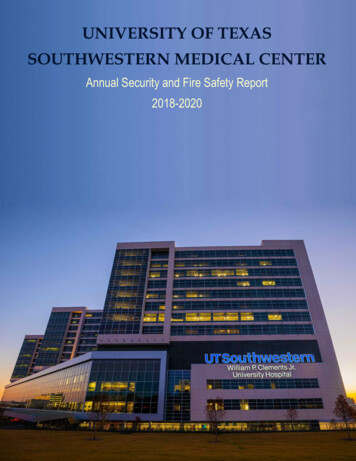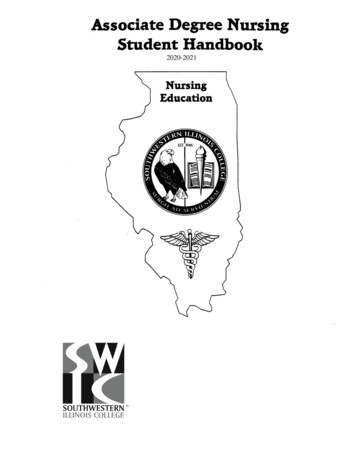
Transcription
2020-2021
SOUTHWESTERN ILLINOIS COLLEGENURSING EDUCATIONASSOCIATE DEGREE NURSINGSTUDENT HANDBOOKRevised and ReviewedApril 2020
SOUTHWESTERN ILLINOIS COLLEGENURSING EDUCATIONTABLE OF CONTENTSIntroduction.1-2Philosophy . 3Purpose & Program Outcomes . .4-5End of Program Student Learning Outcomes . 6Conceptual Framework . . 7Conceptual Framework Model . 8Policies Related to Attendance .9-10Returning Policies . 11Returning Students .12-13Exit Interview and Intent to Return Policy . 14Transfer Students Policy . 14Intent to Return Form. 15Exit Interview Form . 16Student Responsibility Policy .17-18Faculty Academic Advisement Day. 18Counseling . 18NCLEX - RN . 19Health Policy . 20Promotion Policy .21-22Test Review Policy . 22Nursing Skills List .23-25Liability Insurance Policy . 26Student Employment . 27Nursing Education PoliciesStudent Information Sheet .29-30Medical Examination .31-32Student Nurse Functions . 33Cooperating Agency Agreement . 34Student Release of Liability . 35Safety Information. 36Mercury Instruments . 37Latex Sensitivity.38-41Recommendations Following Occupational Exposure to Bloodborne Pathogens .42-54Advanced Standing Students . 55Transfer Students . 56LPN and Nurse Assistant Students .56-57Articulation Info for Nursing Assistants.58-59Articulation Info for LPN’s .60-61
Permission for E-mail Information . 62Permission to E-Mail Course Information Form . 63Supplies and Costs . 64Necessary Items for Nursing . 65Nursing Education Cost Sheet for Generic Students. 66Nursing Education Cost Sheet for Advance Standing Students. 67Additional Program Costs .68-69Dress Codes . 70Uniform and Dress Regulations .71-72Cell Phone / Electronic Devises Policy . 72Information Pertaining to Licensure Sanctions . 73Licensure Application Information. 74Academic Code of Conduct . 75Professional Conduct . 76Social Networking . 77Drug Policy . 78Guidelines for Student Nurses attending Faculty Meetings . 79The Illinois Nursing Act .80-86Code of Ethics . 87SWIC Student Rights & Conduct .88-92Consent Form . 93ATI Policy . 94Student Contract.95
INTRODUCTIONThe Associate Degree Nursing Education Program at Southwestern Illinois College began in 1958as a three year program. The two year Associate Degree Nursing Program was instituted in 1964.It was the first ADN program in the State of Illinois and became the first NLN accredited programin Illinois. The name of the college was changed to Southwestern Illinois College, January 2000.The program has continued to maintain accreditation with ACEN. Last accreditation visit wasduring the 2015 academic year with reaccreditation granted for 8 years. Current accreditation isheld with Accreditation Commission for Education in Nursing, 3343 Peachtree Road, N.E. Ste. 850;Atlanta, GA 30326, 404-975-5000, www.acenursing.org.The program has also continued to maintain approval with Illinois Department of ProfessionalRegulation, 320 W. Washington, Springfield, IL, 62786, 217-785-0800. Last approval visit was in1995 and is continuous. Routine visits are not made unless needed due to decreasing outcomes.The program of nursing is designed for persons who wish to become registered nurses. Theprogram combines classroom experiences on the SWIC campus with clinical experience incommunity health facilities. Students who complete the nursing program are awarded an Associatein Applied Science degree and are eligible to write the National Council Licensure Examination tobecome a Registered Nurse (NCLEX-RN).The goal of nursing education is to provide safe practitioners of nursing to the community. Thenursing faculty believes that education is a continuous learning process which assists students toprogress toward self-realization. The program in nursing provides students with an opportunity togain knowledge and understanding of nursing concepts and to develop skills in applying theseconcepts to patient care in a variety of settings. In order to prepare graduates who will beresponsible members of the health team, the faculty in nursing education provides an environmentthat guides students toward assuming responsibility for identifying their own goals and provides theopportunity for self-directed learning throughout the program. Students assume responsibility fortheir own learning while faculty members act as facilitators, stimulating and guiding the students'thinking.The program in nursing has policies established to insure that the student is aware of theresponsibilities involved in pursuing a health career education and to help the student achievesuccess. The demands placed upon nursing students may seem restrictive and structured, butnursing is a structured profession and its practioners are responsible in life and death situations.Procedures and policies are made for the welfare and safety of patients.Students must attend classes and clinicals regularly. Both the classroom, clinical, and lab sessionsare related so that missing a class period may cause the student to be inadequately prepared toparticipate in clinical or lab sessions.Clinical experiences are planned for students in a variety of agencies. Students will need to beflexible and adjust to stipulations of these various clinical facilities. You are expected to conform tothe procedures and policies of the agencies and to adhere to a dress code that is becoming to theprofession and in accordance with regulations. We expect students to conduct themselves1
professionally at all times in their role as student nurses.If you have children at home or other family responsibilities, please make adequate arrangements inadvance. It is against college policy to bring children to class. It would be wise for students withfamilies to include those family members in planning a schedule. It is important that familymembers understand the time commitment involved in study and preparation for patientassignments. Outside working hours should be arranged so that there will be no conflict with yourclassroom or clinical schedule. It is important that you obtain an adequate amount of rest so thatyou will remain mentally and physically healthy while pursuing your nursing career.Essentially, the nursing program will necessitate much self-discipline. If nursing is what you wantand you are willing to put forth the effort necessary to successfully complete the program, you willfind the next two years challenging, fulfilling and exciting and will enter a profession that offers alifetime of rewarding service and growth.Best wishes for a successful journey from student to Registered Nurse.2
SOUTHWESTERN ILLINOIS COLLEGENURSING EDUCATIONPHILOSOPHYThe patient is a unique individual, interacting with the environment and having basic needswhich must be met to maintain health. Health is a dynamic state dependent on the patient’sability to maintain individual wellness on a continuum. Nursing is synonymous with caring andinvolves the interaction of Nurse and Patient to attain, maintain, and restore health throughmutual goal setting. The nurse diagnoses and treats the Patient’s response to actual and potentialhealth needs through the use of the nursing process consisting of assessment, nursing diagnosis,planning, implementation, and evaluation, within the Guidelines of the Nurse Practice Act of theState of Illinois. The patient exists in an environment which includes physical, social andcultural aspects. These influence the patient’s position on the continuum of wellness.Nursing education is an integrated process through which students gain the knowledge,understanding, and skills necessary to practice nursing. The nursing program integratesclassroom, simulated laboratory, and clinical laboratory learning. Syllabi, written materials,multimedia materials, and computer aided instruction are some of the methods used to aid thestudent in preparation. The academic setting provides the opportunity for the student to expandlearning. A staffed auto tutorial lab assists the students with the learning of psychomotor skills.College laboratory time is utilized to validate and expand on skills needed before entering theclinical setting. Multiple settings: home, community, and hospital, allow the student to carry outthe nursing process in a variety of planned learning experiences.Teaching and learning is an interactive process whereby both teacher and learner assumeresponsibility for the acquisition of knowledge. Teaching is a process which facilitates anotherto gain knowledge, skills, and insights, and to acquire psychomotor skills. The learner, a selfdirected and active participant in the learning process, is accountable for personal behavior andperformance. Learning is enhanced by various methods including the use of multi-media to helpthe learner think critically and achieve success. Learning is a life long process that influencescognitive, affective, and psychomotor domains, leading to individual growth and influencingthinking, values and actions.The nursing curriculum prepares the Associate Degree Nurse to utilize the nursing process withmembers of the health care team in providing and managing care, and teaching the patients. Thegraduate is prepared to practice autonomously within the guidelines of the Nurse Practice Act ofthe State of Illinois, in an entry level position. The graduate is also accountable for care givenand care which has been appropriately delegated to other members of the health care team. Thegraduate also identifies situations in which additional guidance is needed and seeks suchguidance appropriately.3
PURPOSE OF THE NURSING EDUCATION CURRICULUM:In accordance with the Illinois Nursing and Advanced Practice Nursing Act, 2017, thepurpose of the Nursing Education curriculum at SWIC is to prepare students to:1.Apply for the NCLEX-RN exam after successful completion of the program and toapply for licensure as registered professional nurses after successfully completingthe NCLEX-RN.2.Practice entry-level professional nursing only under the direct supervision of theregistered professional nurse until item No. 1 has been accomplished.3.Practice professional nursing at a beginning staff level after successfully completingthe NCLEX-RN and receiving licensure as a registered professional nurse.4
SOUTHWESTERN ILLINOIS COLLEGENURSING EDUCATIONPROGRAM OUTCOMES1.NCLEX Pass rate:Program NCLEX pass rate will be 80% or above for the same time periods calculated.2.Program completion:70% or more of generic students will complete the nursing curriculum within 150% of thecatalog program length or 3 academic years. (6 semesters)50% or more of LPN to RN students who successfully complete summer classes willcomplete the remainder of the curriculum within 150% of the catalog program length or 2academic years. (4 semesters)3.Job Placement rates:70% of graduating students will state on the graduate exit survey that they have eitherobtained employment or the promise of employment within the profession.85% of graduates returning the nursing education follow up survey will state they haveobtained employment within the profession.5
SOUTHWESTERN ILLINOIS COLLEGENURSING EDUCATIONEND OF PROGRAM STUDENT LEARNING OUTCOMES1.The graduate is able to think critically by applying the nursing process in providingcomprehensive care for a group of patients from diverse backgrounds whose needs be atvarious positions on the health continuum.2.The graduate is aware of his/her own behavior and its influence on others.3.The graduate is able to utilize effective, caring communication and interventions with thepatient and the support system in assisting the patient to meet needs.4.The graduate is able to collaborate with other health team members in coordinating patientcare in a variety of clinical settings.5.The graduate is responsible for his/her own behavior within the profession's ethicalstandards and legal framework.6
SOUTHWESTERN ILLINOIS COLLEGENURSING EDUCATIONCONCEPTUAL FRAMEWORKThe Nursing Education Program offers a curriculum based on the following concepts: the healthcontinuum, the nursing process and the basic human needs as defined by the faculty.Every individual has basic needs which must be met to maintain his/her integrity. The faculty hasselected the following needs: activity and mobility, comfort, communication, elimination, love andbelonging, nutrition, oxygen, rest and sleep, safety, self-awareness and self-esteem, and sexuality.Health is viewed on a continuum representing degrees of wellness or illness that the individual mayexperience at any given time. Health is defined by the faculty as the individual functioning withinhis/her environment to successfully meet his/her needs. When there is an alteration in the ability tomeet basic needs the individual moves toward illness on the continuum.The nursing process is a systematic method of thinking critically to assist the individual to meethis/her needs at some point along a continuum. The nursing process involves: assessment, nursingdiagnosis, planning, implementation, and evaluation. The process is used in promoting, maintainingor restoring, the individual to his/her health potential.The curriculum sub concepts identified by the faculty are: personal growth, legal and ethicalaspects, developmental stages, health teaching, pharmacology, and sociocultural aspects.The faculty consider nursing and caring to be synonymous. The individual, teaching and learningprocess, and AD nursing, is at the center of the curriculum model.7
Southwestern Illinois CollegeAssociate Degree Nursing ProgramLegal & Ethical AspectsHealth ContinuumDevelopmentalStagesThe IndividualCaringNursingNursing EducationTeaching/LearningProcessAD ocessSocio-CulturalAspectsHealth TeachingCONCEPTUAL FRAMEWORK8
NURSING EDUCATIONPOLICIES RELATED TO ATTENDANCEThe nursing education program is a structured curriculum designed to be completed in sequence.Students accepted into the program will be enrolled in the required classes and must complete theseclasses in the specified order to maintain qualified program status.ABSENCE POLICYa.When the student misses a laboratory period (ATL, which is the auto-tutorial nursing lab, orclinical) the make-up experience will be made up as determined by the instructor. AnIncomplete will be given, if necessary, until make-up is done.b.(1)Eight-week module: Any student missing the equivalent of more than one day oflecture and/or laboratory may be dropped from the program.(2)Sixteen-week course: Any student missing the equivalent of one week oflecture/discussion and/or laboratory may be dropped from the program.c.Students who miss a class will be expected to submit any material from the missed class ie:the study guide, case history, etc. before the next class. An “I” will be given until theserequired materials are submitted.9
ILLNESS AND PHYSICIAN'S STATEMENTa.A student who has incurred an absence and required medical attention must present to theinstructor involved a statement from his/her physician on official physician's stationarystating permission to return to both clinical and classroom participation. Any limitationsmust be noted by the physician.DROPPING COURSESThe deadline for dropping an eight-week Nursing module is prior to completion of the sixth week ofthat particular module of study. The withdrawal procedure for regular semester courses will be thesame as the existing College policy.If a course is to be dropped it is the student’s responsibility to drop the course whenever possible.Faculty submit course drops when grade rosters are due. Any other date for course drops require an‘Add-Drop’ form which has to be signed by student, instructor, and Dean or confirm withregistration that the course has been officially dropped.10
RETURNING POLICIES11
SOUTHWESTERN ILLINOIS COLLEGENURSING EDUCATIONReturning StudentsStudents who seek to return to the program may have recommendations made by the nursingfaculty, following withdrawal. The exit interview form and the intent to return form must becompleted and on file. These forms are included in this Handbook. Information is also continuedunder “Policies – Promotion/Grading.”1.Students seeking to return must be in good academic standing in the college,having achieved a GPA of 2.00 or better (based on 4-point scale) in all previouscollege work at SWIC. Calculation of GPA for readmission will not include thenursing course failure.2.Students seeking to return to NE 106 or NE 108 must demonstrate ability toperform selected nursing skills included in NE 103, in addition to those inNE 106 and NE 108, as applicable.3.Students who seek to return to a second level course are required to meet any facultyrecommendations prior to re-entry. A student who needs to repeat a spring,second level course must repeat both courses in that semester.4.All nursing courses for the Associate of Applied Science Degree must be completedwithin a five year period of first admission to the nursing program.5.If a nursing course was failed and the student plans on retaking the nursing course, itmust be taken the next year it is offered. Students cannot “sit out” a year following anursing course failure.6.Faculty reserves the right to make recommendations to students to better preparethem for success.7.Returning students will be accepted only when the maximum number of studentsthat can be accommodated in the nursing course would not be exceeded. If space islimited, students requesting returning will be ranked according to their NE courseGPA.12
9.The order of priority for students requesting readmission if space is available is:a.Students who withdrew from the SWIC Nursing EducationProgram due to circumstances beyond their control willhave first priority.b.Students who experienced course failures and are eligible tore-enter will have second priority.c.Students transferring from another nursing program in goodstanding will have third priority.d.Students who withdrew from the SWIC nursing program ontheir own initiative, without consulting with the nursingprogram coordinators and/or students who were dropped forexcessive absences will have fourth priority.e.Students not in good standing who wish to transfer fromanother program will have fifth priority.Any student who fails two SWIC nursing courses is ineligible for return to the SWIC NursingEducation Program. (Any transfer student with two previous nursing course failures fromany nursing program will be allowed only 1 additional nursing course failure at SWIC.)Any student who withdraws before mid-term with a failing grade after taking two contenttests will be given a W but will be considered as having failed for readmission purposes.Any student who withdraws after mid-term with a failing grade will be considered as havingfailed for readmission purposes.Returning students should request a student handbook current for the year in which they reenter the program as current policies will apply.Students who are not successful in the first of 2 of the 8 week courses, NE 106/108 or 207/209cannot progress and are responsible for dropping the following NE course that they may haveenrolled in. This is the student’s responsibility. Failure to do so may result in tuitionconsequences. Again, during the final semester BOTH of the 8 week courses NE 210/211 mustbe successfully completed during the same semester.The nursing education program is a structured curriculum designed to be completed insequence. Students accepted into the program will be enrolled in the classes required by theprogram in order to maintain qualified program status.Students must successfully complete the first full fall semester to maintain qualified status inthe program. In the event a student exits, without meeting this requirement, the student willneed to reapply for program admittance.13
EXIT INTERVIEW AND INTENT TO RETURN POLICYStudents who are dropped, withdraw or fail from a nursing course for any reason must complete anintent to return form and an exit interview form to be eligible to return. Students will not beconsidered unless the intent to return and exit interview forms have been completed. It is thestudent’s responsibility to complete the intent to return and exit interview forms as soon as possibleafter the course failure. The intent to return and the exit interview forms are located on the nextthree pages of this book.Intent to return form and exit interview form must be completed and submitted bySeptember 1st if students plan on returning to NE 105, NE 106, NE 108, or NE 210/NE 211.Intent to return form and exit interview form must be completed and submitted by June 1st ifstudents plan on returning to NE 102, NE 103, NE 104, NE 207, or NE 209.TRANSFER STUDENTSA student transferring to Southwestern Illinois College Nursing Education program after failing twonursing courses in another nursing program, will be allowed only one additional failure in a nursingcourse at Southwestern Illinois College. Transfer students should provide documentation, from theprevious program Director or Administrator specifically, which identifies standing in that program.If the student could NOT return to the previous program for other reasons, the student will beconsidered to have failed the previous program and only ONE additional nursing course failure willbe allowed at SWIC.14
INTENT TO RETURNI wish to return to course:print nameCircle course(s)NE 102NE 103NE 104NE 105NE 106NE 108NE 207NE 209NE 210 and NE 211In theFALLorSPRINGcircle oneyear .I understand I must return the next calendar year that this course is offered. Students cannot “sitout” a year following a nursing course failure.I must complete the requirements of the Nursing Education Program within 5 years of beginning.SignatureDate15
EXIT INTERVIEW(For returning students)NameAddressPhoneEmploymentInstitution or facility, etc.Hours per weekFinancial AidAre you receiving financial aid?If so, have you made any necessary arrangements?Date and course of withdrawal or failureWhat do you the student identify as the reason for your withdrawal or failure?Can you identify factors, which interfered with your ability to be successful?Have you received or sought any assistance such as counseling, tutoring, etc?In your estimation, what assistance could have been provided to you?Were there any recommendations from your instructor that would help?What are your plans to carry out these recommendations?What other actions will you take to enable you to be successful?16
SOUTHWESTERN ILLINOIS COLLEGENURSING EDUCATIONPOLICIES - STUDENT RESPONSIBILITY1.The student must take the initiative in contacting the instructor within one week in regard to thefollowing:2.a.low test gradeb.unsatisfactory laboratory performance (clinical or ATL)c.classroom absenced.clinical absenceInstructors have scheduled office hours. Please make an appointment as early as possible to seethe individual instructor who was in charge of the class or clinical experience. Instructors alsohave voice mail and e-mail and, in addition, can usually be contacted through Black Board.3.The student should make satisfactory arrangements for the care of their children. Sincechildhood illness, schedule changes, etc. cannot be anticipated, it is well to have emergency/alternate plan of care for your child (e.g. a friend or neighbor who can baby-sit at a moment'snotice when the child can't attend school).4.Students should keep their family informed of the location of clinical assignments. Anyemergency calls for the student must be directed to the clinical instructor. Students will nothave access to cell p
The Associate Degree Nursing Education Program at Southwestern Illinois College began in 1958 as a three year program. The two year Associate Degree Nursing Program was instituted in 1964. It was the first ADN program in the State of Illinois and became the first NLN accredited program in Illinois.


